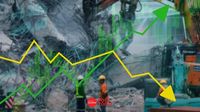On March 28, 2025, a significant earthquake struck Myanmar, sending tremors that were felt across the border in Thailand. In response to the natural disaster, Sena Development Public Company Limited (SENA) mobilized a team of engineers to conduct urgent inspections of all its high-rise building projects. The inspections were completed by 11 PM on the same day, ensuring that residents and stakeholders were promptly informed about the safety of the structures.
Dr. Yui Kesara Thanyalakpark, the Executive Director of Sena Development, stated, "We have expedited the inspection of all projects, both those that have been delivered and those under construction. Our focus was on critical structural elements such as foundations, columns, beams, electrical systems, and plumbing to assess the buildings' strength and safety according to engineering standards."
By March 30, the inspection team confirmed that all projects were in a safe and stable condition, suitable for habitation and operation. The inspections revealed no significant structural damage, only minor cosmetic issues related to the tremors, which did not affect the integrity of the buildings. Sena's team remained on-site to monitor the situation closely and established a special service center to assist residents with any concerns they might have.
Dr. Thanyalakpark emphasized the company's commitment to safety, stating, "The safety of our residents is our utmost priority. All our projects are designed according to international safety standards. We appreciate the trust and confidence our residents have in us, and we are ready to support them fully." This proactive approach has been crucial in alleviating residents' fears following the earthquake.
Meanwhile, the earthquake's impact on the Thai stock market has been a topic of analysis among financial experts. Reports from two brokerage firms, Trinity Securities and Asia Plus, assessed the earthquake's potential effects on the Thai stock market, particularly focusing on sectors that could either benefit or suffer due to the disaster.
According to Trinity Securities, the earthquake is not expected to have as severe and prolonged an impact on the SET Index as previous disasters such as the 2004 tsunami or the 2011 floods, both of which required extensive time for recovery and rebuilding. They noted that the short-term psychological impact on the market might resemble the initial phase of the COVID-19 pandemic, where fear led to reduced consumer activity.
The firm identified several sectors likely to experience negative impacts. The construction industry, particularly companies involved in high-rise buildings, could face significant setbacks. For example, ITD, a major construction service provider, was highlighted as being particularly vulnerable. Additionally, real estate developers with a high proportion of condominium projects may see a downturn in sales and profit margins, impacting companies like Ananda Development, Origin Property, and SC Asset.
Moreover, the insurance sector could experience moderate negative effects, especially those dealing with construction-related products, while the tourism sector may also suffer due to decreased confidence among international travelers, particularly from China. Companies such as Airports of Thailand (AOT) and Thai Airways (AAV) could see reduced demand.
Conversely, some sectors were identified as likely to benefit from the earthquake. The construction materials sector, including companies like SCG, SCCC, and TPIPL, may see increased demand for repair and renovation supplies. Engineering service providers, such as TEAMG and STI, might also benefit from a rise in construction oversight and inspection work.
Asia Plus echoed similar sentiments, noting that Thailand has faced three major disasters in the past— the tsunami, major flooding, and the Chiang Rai earthquake. They estimated that the recent earthquake could inflict economic damage ranging from 3 to 5 billion baht, impacting GDP by approximately 0.025%. However, they also noted that the economy could rebound quickly once the situation stabilizes.
The firm compared the earthquake's effects to the 2004 tsunami, suggesting that while the SET Index might drop initially, it could recover within one to three months as foreign investment returns. The analysis highlighted that the earthquake's impact on various sectors would vary significantly, with the real estate sector expected to face the most substantial challenges.
In terms of immediate stock market reactions, analysts advised caution for investors in the real estate sector, recommending reduced exposure until confidence returns. They noted that the recovery of the real estate market would depend on the swift actions of both government and private sector stakeholders to restore trust and safety.
In the aftermath of the earthquake, the energy and petrochemical sectors reported no immediate impacts, as companies like PTT and PTTEP confirmed that their operations continued as usual. The electricity sector also reported stability, with companies such as RATCH and GPSC stating that their projects were unaffected.
As the situation unfolds, the Thai stock market remains under close observation, with analysts emphasizing the importance of monitoring both the economic recovery and the psychological impact on consumers. The assessments highlight a complex interplay of factors that will shape the market's response in the coming weeks.
In summary, while the earthquake presents challenges, particularly for the real estate and construction sectors, it also opens opportunities for growth in construction materials and engineering services. The proactive measures taken by companies like Sena Development demonstrate a commitment to safety and community support, which will be vital as Thailand navigates the aftermath of this natural disaster.







